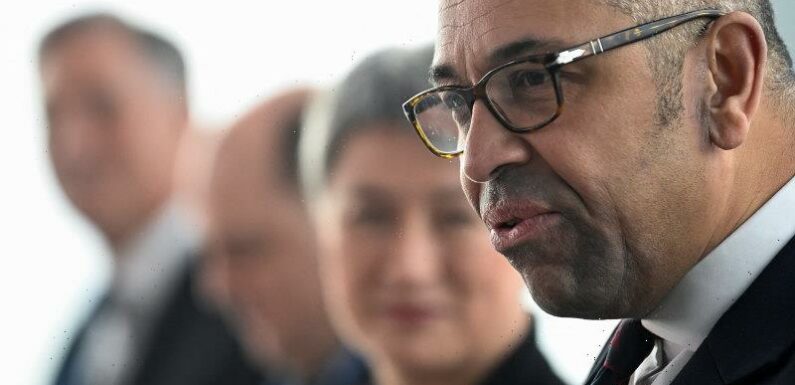
Portsmouth: Britain’s Foreign Secretary James Cleverly said his country would always be conscious of its colonial past within the Indo-Pacific but could not erase the past, as the UK seeks greater ties to counter China’s influence within the region.
Cleverly on Thursday dismissed the notion that comments from Foreign Affairs Minister Penny Wong earlier this week calling for countries such as Britain to come to terms with its “uncomfortable” colonial past had caused a rift between the pair.
Britain and Australia meanwhile reaffirmed their pledge for greater co-operation in diplomatic efforts.
Britain’s Foreign Secretary James Cleverly holds a press conference with Foreign Minister Penny Wong.Credit:Getty
Wong, who was born in Malaysia and is of Chinese and British descent, said in a speech at King’s College London on Tuesday that former imperial powers must not remain “sheltered in narrower versions” of their pasts when it came to engaging in the region and trying to find “more common ground”.
Cleverly, who is the first black man to hold his position, stressed following the meeting, known as AUKMIN, there had been “no tensions” or “awkwardness” over the comments and that the pair had previously discussed the issue of Britain’s relationship with its former colonies and the wider Commonwealth. He had told this masthead on Wednesday he was proof that Britain was arresting its legacy.
“It is about recognising you cannot eradicate or erase your history, so you need to be conscious of it,” Cleverly said in response to a question about Wong’s remarks.
“I think it is incumbent upon the UK, in our dealings with Australia or any other country with which we were once a colonial power, to recognise that we need to demonstrate that this is a modern partnership, a partnership of equals – different but equal, geographically separated but emotionally and historically bound.”
He said he was “absolutely confident” that a “renewed, refreshed, enhanced, strengthened” relationship with Australia was the start of a “beautiful friendship”.
Britain has joined the United States, Australia and France in efforts to rebuild its presence within the vast region, which takes in northeast Asia and southeast Asia, south Asia and Oceania, including the Pacific Islands, as a direct response to Chinese attempts to destabilise the region through military and economic coercion, unlawful maritime claims and threats to maritime shipping lanes.
Australia’s Foreign Minister Penny Wong and British Foreign Secretary James Cleverly.Credit:Getty
At the height of its empire, Britain ruled India, Burma [Myanmar], Malaya [Malaysia], Singapore, British Borneo [Malaysia], Hong Kong and a series of small island colonies across the central and southern Pacific Ocean as well as dominions including Australia, New Zealand and Canada.
Part of Beijing’s propaganda narrative in dealing with nations in the region is to push negative assessments of Britain’s governance, its relationship with the world, and its colonial history while projecting a positive and benign image of China and the Communist Party’s governance model.
The Chinese foreign ministry on Wednesday said AUKUS, the pact in which the US and Britain will assist Australia to develop a nuclear submarine fleet, reflected “a Cold War mentality” that could stoke military confrontation and has previously accused Britain of neo-colonial policies.
Wong, whose comments had attracted headlines in Australia and the UK media, said the modern face of both nations was representative through the ethnic backgrounds of her and her counterpart and that had made nations “stronger and more influential” in its diplomatic efforts.
British Foreign Secretary James Cleverly says his country cannot “erase” its colonial past. Credit:Getty
“In the time of strategic competition we have to make sure we are not being framed by others and we frame ourselves,” she said.
The meeting, held at the Spinnaker Tower in Portsmouth, covered a range of issues which are part of long-term cooperation between the countries to promote prosperity in the Indo-Pacific as well as broader cooperation on climate, security and trade.
Cleverly said the UK’s work with Australia to promote open societies and economic security in the area was crucial to boosting trade with the Indo-Pacific, which is set to account for half of global growth by 2050.
The group also discussed efforts by western allies to support Ukraine in its battle to regain territory lost following last February’s invasion by Russia.
Britain’s Defence Secretary, Ben Wallace, said it was important to recognise that the world’s rules-based order was “under threat like never before” and that human rights were being threatened “by a range of characters”.
“Indeed people are testing [the] sovereignty of nation states in a way that should worry us all. And whether you are in Ukraine or whether you are in the far Pacific from a United Kingdom point of view those values are true and are worth standing up for,” he said.
Defence Minister Richard Marles said one of the major points of agreement during the summit was on AUKUS, a trilateral defence program with the UK and US to provide Australia with nuclear-powered submarines.
Marles said the submarine plan was a “huge moment” in the country’s history which would “change Australia’s international personality”, by dramatically building its capability and “with that, our sovereignty”.
Get a note directly from our foreign correspondents on what’s making headlines around the world. Sign up for the weekly What in the World newsletter here.
Most Viewed in World
From our partners
Source: Read Full Article


